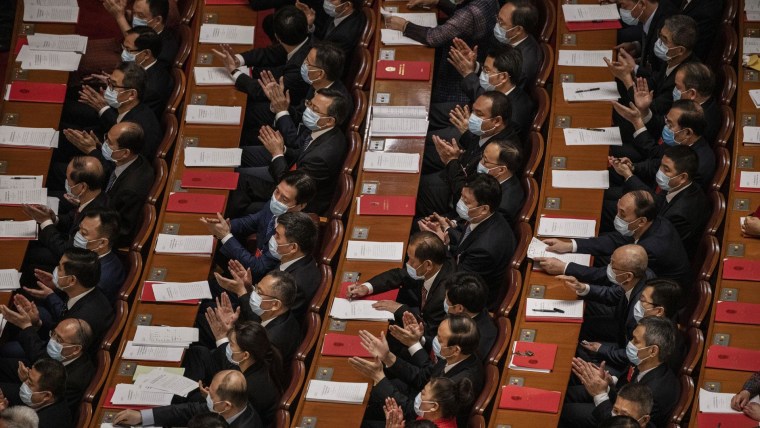HONG KONG — Beijing formally enacted security laws for Hong Kong on Tuesday, according to Chinese state media, paving the way for one of the most profound changes to the governing of the territory in decades.
China stunned the world in May when it announced that it would side-step Hong Kong's own legislature and pass national security laws direct from Beijing.
According to state-run Xinhua news agency, the law was approved unanimously by the National People's Congress Standing Committee and signed into law by President Xi Jinping. It will likely come into effect from Wednesday, carrying an expected maximum penalty of life in jail for some crimes.
The law — passed on the eve of the 23rd anniversary of Hong Kong's return to Chinese rule — will allow Beijing to set up special police and prosecution units in Hong Kong to punish crimes considered threatening to China.
The move is widely seen as a blow to the "one country, two systems" policy agreed by Britain and China in 1997 during the handover of the territory, which allowed Hong Kong to adopt a political system separate to the mainland.
Officials in Beijing and Hong Kong have been at pains to reassure that the law will not erode the city's high degree of autonomy, insisting it will only target a minority of "troublemakers" who pose a threat to national security.
State media is expected to publish further details of the law — which aims to tackle subversion, separatism and collusion with foreign forces — later on Tuesday.
The law comes in response to last year's sometimes violent pro-democracy protests that swept the city.
Louis Chan, 40, was born and raised in Hong Kong and told NBC News he was preparing to leave for Australia with his two children following the enactment of the law — viewing it as an encroachment on Hong Kong's cherished freedoms.
"I feel sad. I kept asking myself why do I leave? Do I need to leave? But for my children’s good ... I have to make this decision," he said.
Amid fears the legislation will crush the financial hub's civil rights and freedoms, prominent pro-democracy activist Joshua Wong announced he was quitting "Demosisto," the pro-democracy group he formed.
"The will of Hong Kong will not be frozen by National Security laws or any evil law," Wong said in a written statement, when reports of the new law emerged. "I will continue to stay in my home, Hong Kong, until they silence me."
Hundreds marched through the city's streets on Sunday in protest at the law, but pro-China protesters were also out in support of the mainland.
Former Hong Kong Chief Executive C.Y. Leung wrote on Facebook on Tuesday that he would offer a reward of up to HK$1 million to those who assisted in the arrest of violators of the security law, sharing a hotline number.
Current Chief Executive Carrie Lam said during an address to the United Nations' Human Rights Council on Tuesday that the territory had been "traumatized by escalating violence" and unable to "gate-keep" its own security.
"The law will have no retrospective effect," she told the U.N. by video. "It will not affect legitimate rights and freedoms."
The security law sparked global condemnation when proposed in May, during China's National People's Congress — a huge annual political gathering. The meeting approved the framework of the law by 2,878 votes to 1, but the details were only furnished this month by senior party officials.
Fending off international criticism, China has repeatedly warned foreign governments against interfering in its internal affairs.
The United States has heavily criticized the law and said it will withdraw some of Hong Kong's preferential trade conditions, stating that the territory can no longer be regarded as sufficiently autonomous from the mainland.
On Friday, Secretary of State Mike Pompeo said the U.S. was taking action to "punish" China for "eviscerating Hong Kong's freedoms," announcing U.S. visa restrictions for some Communist Party officials. China retaliated with a similar measure, restricting visas to some U.S. officials.
Pompeo hit back that the tit-for-tat move "exposes once again how Beijing refuses to take responsibility for its own choices," he said in a statement late Monday. Adding that the U.S. was also considering barring defense exports to Hong Kong.
"China will not be intimidated," Foreign ministry spokesperson Zhao Lijian said on Tuesday.
"The United States' attempt to obstruct China's advancement of Hong Kong’s national security legislation through so-called sanctions will never succeed," he said. Adding that China will take "necessary countermeasures."
Last week, the U.S. Senate also approved a bill that would impose mandatory sanctions on people or companies that back efforts to restrict Hong Kong's autonomy.
British Prime Minister Boris Johnson offered earlier this month to provide passports and a path to citizenship to as many as 3 million Hong Kong residents. Taiwan has voiced similar support.
Benedict Rogers lived in Hong Kong during the British handover in 1997 and co-founded Hong Kong Watch, a British charity and advocacy group that monitors threats to Hong Kong's freedoms. He said the law's passage was "heartbreaking" and had "decimated" Hong Kong's autonomy.
"It's profoundly concerning and it's really the biggest crisis Hong Kong has faced in its modern history," he told NBC News by telephone.
"And could well mean the death of Hong Kong as we know it."
Justin Solomon reported from Hong Kong. Adela Suliman reported from London.


